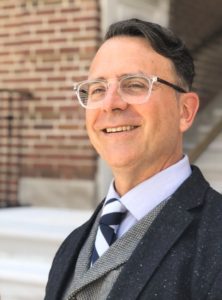Bona Verba from the Headmaster
At Cincinnati Classical Academy, we talk a lot about our “content-rich curriculum in the liberal arts.” Unfortunately, in our day and age, the utilitarian faction of American educators has encumbered the term “liberal arts” with numerous negative connotations, primarily aligned with the idea that this is the self-indulgent pursuit of useless knowledge.
It is instructive to note that when we at CLASSICAL speak of the liberal arts, we do so with the classical understanding of that broad range of academic disciplines that are traditionally considered essential to a well-rounded education of the human person. The term “liberal arts” derives from the Latin word liberalis, which means “appropriate for free people” and reflects the idea that a liberal arts education is essential for developing a free and democratic society.
Perhaps the best apologia for a liberal arts education I’ve read recently comes from Dr. Mark Kalthoff, Chairman of the History Department at Hillsdale College, who writes that “the liberal arts aim to make a particular kind of human being, one of character and self-government, the kind of human being who both knows what is good, true, and beautiful, and how to love such things in the right way.”
What many people may not know is that the natural sciences are classical disciplines comprising the central arc of an authentic liberal arts education. Consequently, our content-rich curriculum at Cincinnati Classical Academy includes a strong focus on the natural sciences. CLASSICAL’s approach to teaching the sciences is grounded in the belief that a deep understanding of scientific principles is necessary for informed citizenship and for addressing many of the challenges facing society today.
In line with the understanding that we approach the natural sciences as a liberal arts endeavor, we believe that science should not be studied primarily for the acquisition of technical skills necessary to secure a lucrative job in the STEM professions. At CLASSICAL, science education is much richer and deeper than simply preparing students to work in the “global economy.”
We believe that science should be approached with respect and wonder at the knowledge that has been gained. We are right to be impressed, even overwhelmed, by how well we have come to know our universe. With our classical approach to science classes, students at CLASSICAL routinely experience a sense of wonder and delight as they consider the stars in the sky, the phases of the moon, the creatures in the sea, the engineering feats of Leonardo Da Vinci, the human body’s ability to heal itself, and so forth.
In our first year, we’ve already put ourselves on the map of local schools that excel in science education. In March, twenty CLASSICAL sixth-graders qualified to advance to the University of Cincinnati’s regional science fair. One of the organizers of the UC event approached me personally during the event to tell me how impressed he was at the presentations given by CLASSICAL students; he also wanted me to know that we brought the largest contingent to UC this year – and they looked sharp, all sporting their full winter uniforms!
We couldn’t have done that without the education and rigorous training provided by our sixth grade science teacher (and Dean of Faculty), Mrs. Karen Puglielli, who has taught middle school science for the past two decades after herself studying the natural sciences at the University of Pennsylvania.
As we move forward with adding a seventh grade – and the seventh grade science curriculum – Cincinnati Classical Academy is proud to announce that we have hired Miss Julia Hoyda (soon to be Dr. Hoyda), who will be defending her Ph.D dissertation in the field of neuroscience at the University of Cincinnati Medical School this summer, to spearhead our science curriculum for the upper grades. Miss Hoyda, a 2018 graduate of Hillsdale College, also brings to CLASSICAL her expertise as an accomplished musician, playing both cello and trombone!
We know we’re just getting started, but one of our many goals is to have a nationally-renowned classical science program serving grades K-12. When students graduate from CLASSICAL, our goal is for them to have an accurate understanding of the fundamental content: the models, theories, and laws of biology, chemistry, physics, and astronomy. Our primary motivation for including science at every grade level is not to churn out future scientists (which will inevitably happen) but to provide our students a fundamental understanding of themselves and their surroundings. As such, science at CLASSICAL is complementary to the humanities in that they study different dimensions of truth but are both necessary to provide a well-rounded education and a satisfactory account of reality.
Curate, ut valeatis!
Michael Rose, Headmaster

Mr. Michael Rose
Meet the Headmaster
Mr. Rose has taught various courses at Brown University, Cincinnati Moeller, and The Summit Country Day School. As a part of his degree work in education, Mr. Rose’s research interests included the Great Books curriculum, the Paideia teaching method, and the “effects of emerging digital technology on student reading, writing, and researching.” Read More

